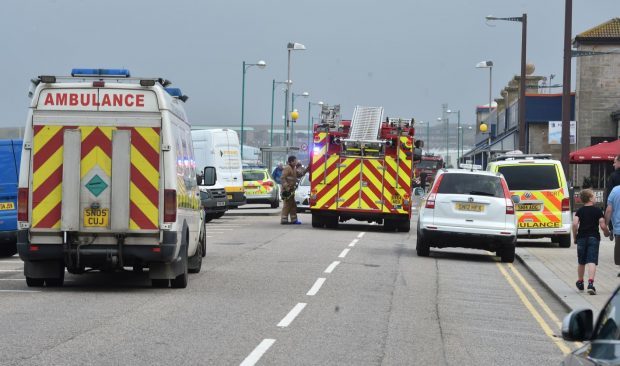Coastguards issued fresh warnings about the dangers of the sea yesterday after the tragedy at Aberdeen beach.
The public were urged to stay away from areas where surging waves could sweep them off their feet.
Ross Greenhill, The Maritime and Coastguard’s Agency’s coastal operations area commander said Saturday’s incident had been a “very tragic accident”.
He added: “Accidents do happen. The coast of the UK is a lovely place, but it can be very dangerous.
“Our job is to get the public to think about the dangers.
“I think sometimes people don’t realise how dangerous it can be.
“It does not take very much for someone to get knocked into the sea.”
Mr Greenhill added the incident could have been “an awful lot worse” bearing in mind the number of people who went into the sea to help.
He said: “We did have a number of people in the water and we managed to get them out safe.
“It is absolutely understandable that people want to help people in trouble, especially when it is a child, but it is best to call the emergency service people with the equipment and knowledge to deal with it.”
Although lifeguards do work at Aberdeen beach, it is a voluntary service which usually runs during the summer holidays, between noon-4pm – when people are most likely to be in the water.
In rough seas, lifeguards often raise red flags warning the public the conditions are too dangerous for swimming.
Mr Greenhill confirmed that although there were no specific warnings in place on Saturday, the sea had been rough enough to warrant a red flag.
However, he added: “With no lifeguards on duty, the flags would not have been up as they are responsible for putting the flags up.
“It would be lovely if we could have lifeguards on every beach all year round, but that is just not possible.
“We could also fill all our beaches with warning signs, but I am not entirely sure they would make much difference.
“We need to make people aware of the dangers.”
Strong winds and stormy conditions led to several tragedies around Britain’s coast.
Three men and a woman died in separate incidents.
A man died after getting into trouble outside the safe swim area at Sandbanks beach at Poole in Dorset on Saturday.
The victim, who was seen struggling in the rip current, was recovered from the water by lifeguards who performed CPR.
An air ambulance and paramedics went to the scene, but the man, believed to be in his 50s, was pronounced dead at the scene.
He is believed to have suffered cardiac arrest.
A woman in her 30s died in hospital after getting into difficulties while swimming with a man near Green Island in Jersey on Saturday night.
The man was helped to safety by members of the public, while a lifeboat managed to locate the woman, who had been swept along the coast by the current.
She was taken to hospital but later died.
Meanwhile, Rudy Bruynius was with wife Lisinda and their daughter McKayla when they were caught up by a large wave at Fistral Beach on the north-west coast of Cornwall on Saturday.
Mr Bruynius, who was originally from South Africa but had bene living in London, was taken to hospital where he was pronounced dead, while McKayla was reported to be in a critical condition.
The RNLI confirmed that two other children in the family managed to scramble to safety.
A windsurfer in his 60s also died at the weekend.
The man, who was rescued by RNLI lifeboats off the coast of West Mersea in Essex around midday on Saturday died in hospital in Colchester.
